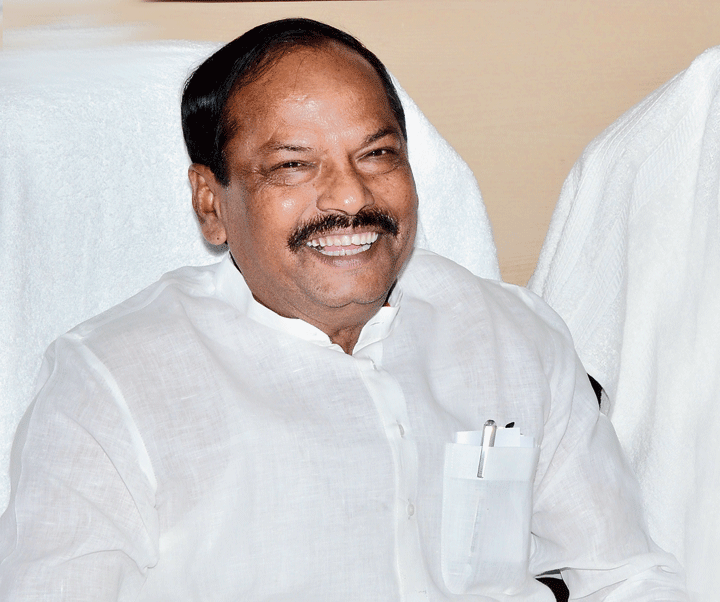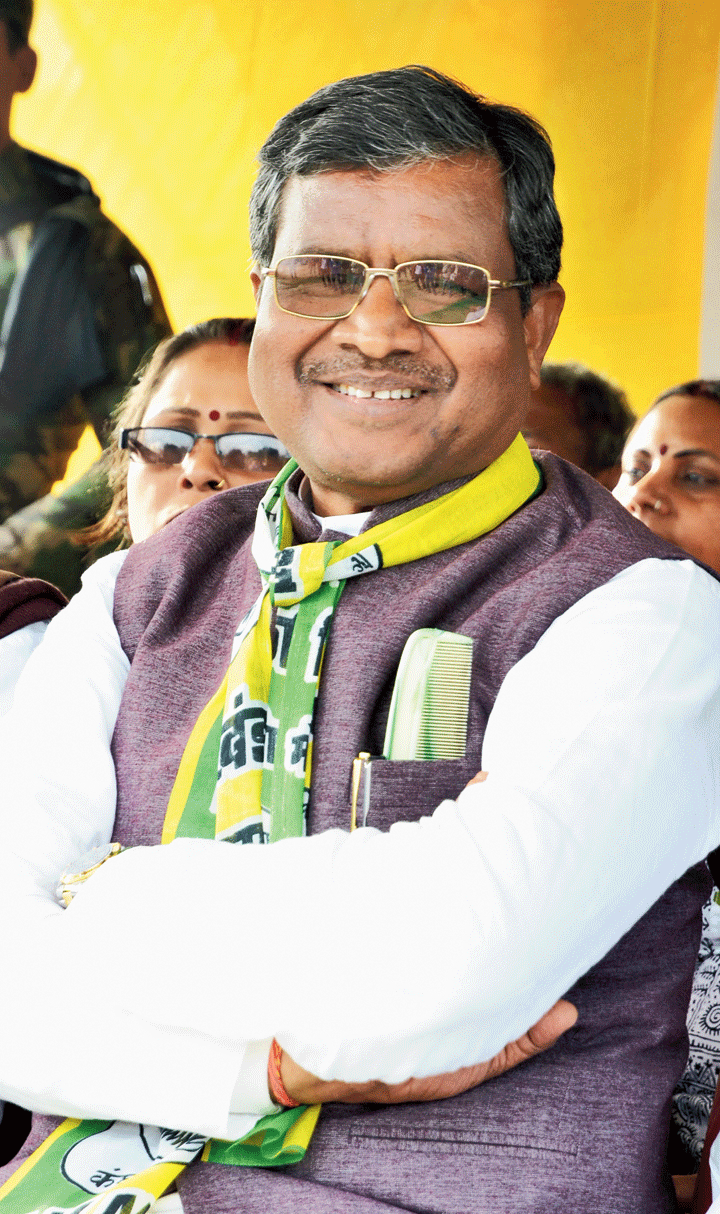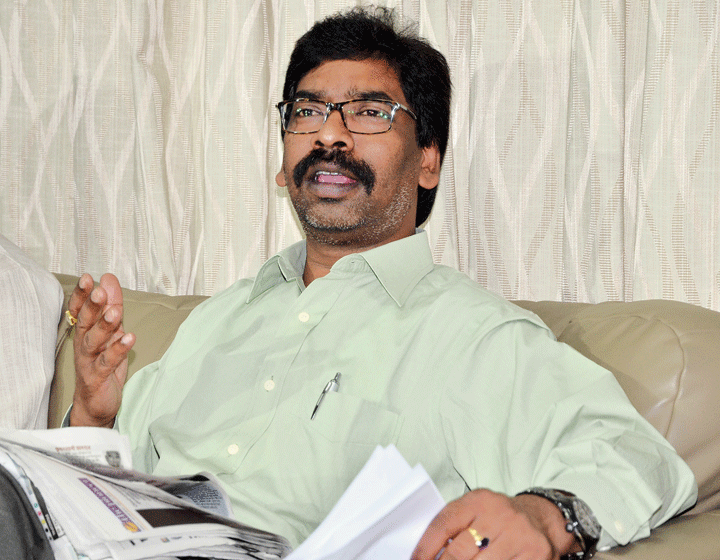Marandi factor
The Opposition is not a united front. The JVM refused to accept former chief minister Hemant as the leader and decided to contest alone. The JMM-led alliance had offered the JVM five seats.
The Left parties are also contesting separately. All these factors will divide the anti-BJP votes. The JVM says it is confident of winning at least 30 seats; if that happens, it will make the Marandi the kingmaker.
“Hemant Soren has neither mien nor quality to become CM,” said JVM vice-president Ramesh Rahi. “The Congress will soon repent for contesting the election under the leadership of this undeserving fellow. People of Jharkhand want Marandi back as CM because people have seen his 28-month tenure as the state’s first chief minister.” The party, however, is divided on whether going solo was the best route to take.
“We should have stayed together and we could have bargained for more seats. This time a shift of one or two per cent of votes will decide the result and we could have done much better in an alliance,” said a close aide of Marandi.
Another party worker justified the decision of Marandi.
“They (the JMM-led alliance) were offering peanuts to us and projecting Hemant as chief minister. In order to retain the status of a state party we had to fight a good number of seats to get a certain vote percentage which was not possible in the JMM-led set-up. Jharkhand will have a fractured mandate and Marandi will be the kingmaker.”
There were other reasons that forced Marandi to stay away from alliance. The JMM and the JVM have the same vote bank — tribals in general and Santhals in particular — and Marandi apprehended that he would not be able to retain his vote bank if he accepted Hemant’s leadership, sources sad. JVM insiders admitted that this Assembly election was crucial for the party as well as its leader.
Marandi has never been in power after he formed the JVM and lost the election himself in 2014 from both Giridih and Dhanwar. He and his party have survived despite that due to party who stood like a rock with Marandi. However, if he cannot emerge as kingmaker this time that rock will have to weather a severe test of strength.
Alliance test
Hemant, JMM sources said, was not too interested to keep Marandi on the Grand Alliance boat.
The JVM was demanding at least 15 seats. But given that six of eight MLAs of Marandi had joined the BJP months after the 2014 Assembly election results, Hemant during a closed-door JMM meeting had said that there was no guarantee that Marandi’s MLAs would not be easy prey for the BJP once again. As part of the seat-sharing deal, The JMM will contest 43, the Congress will fight 31 seats, and the RJD will contest seven. A senior Jharkhand Congress worker admitted that transfer of votes was the biggest challenge.
“We, the Congress and the JMM, often fail to transfer votes to each other; that defeats the very purpose of an alliance. The election process has started but the common manifesto is yet to come and there is no clarity about when joint campaigning will start,” the worker said.
Jharkhand Congress spokesperson Kishore Nath Shahdeo claimed both would roll soon. “We will be close to majority. Even the chief minister is going to be defeated in his constituency. Our star campaigners like chief ministers of Chhattisgarh and Madhya Pradesh besides Sonia Gandhi and Rahul Gandhi will campaign,” said Shahdeo.
The clock has started ticking, and the battle lines have been drawn for the five-phase Assembly polls that begin 10 days from now, on November 30.
The election will decide whether chief minister Raghubar Das has amassed enough capital — blessings of the voters — to win a second term in office. His main challenge is from the JMM-led alliance that includes the Congress and the RJD, with JMM working president Hemant Soren as its chief ministerial candidate.
Also in the mix are the Left parties, and JVM chief Babulal Marandi — who has privately told his workers that the party would hold the key to power as Jharkhand will have a hung Assembly.
The BJP also has an ally niggle. Ajsu Party has walked out of the NDA fold. It will lead to a division of NDA votes.
The BJP has not given up on its ex-ally, as evident from the BJP not announcing any candidate for the Silli Assembly seat against Ajsu Party chief Sudesh Mahto. But the buzz is that the chances of Mahto returning to the BJP alliance are slim.
Das’s problems multiplied when his cabinet colleague Saryu Roy announced to contest from Jamshedpur East seat against the chief minister after the BJP denied the ticket to Roy.
Overnight, Roy became a poster boy of the Opposition parties and anti-Das camp within the BJP.
Jharkhand BJP general secretary Deepak Prakash, however, felt Roy’s rebellion would have no impact.
“In the past also a number of people left the BJP but it did not affect the party in any way because the BJP is a cadre-based party and we follow certain political ideologies. We are confident to win 65 of the total 81 seats. We will contest the election on the agenda of development and political stability. As far as the Ajsu Party is concerned, we don’t have alliance this time. But we are friends and not foes,” Prakash said.
In 2014, the BJP had spared eight seats for the Ajsu Party. Jharkhand BJP president Laxman Gilua claimed the party this time was ready to consider giving 13 to 14 seats. The Ajsu Party was not ready to settle for less than 22 seats.
Mahto was always critical about some policies of the state government, such as bids to amend the Chhotanagpur and Santhal Pargana land tenancy laws, and local residence and employment policy. Mahto feared that supporting the government would dent his personal and political image and that of his party, sources saod. Besides, Mahto was suspicious about the BJP and Das eyeing the core OBC vote bank.
Mahto for the past one-and-half years dropped enough hints for the BJP that he had expansion plans for his party and was no more an obedient junior partner.
During the bypolls for the Gomia and Silli Assembly seats last year, Mahto rejected the BJP’s appeal to give the Gomia seat. However, during the Lok Sabha elections this year, the BJP ceded its winning Giridih parliamentary seat to Mahto’s party. Chandra Prakash Choudhary won as the Ajsu Party candidate. This, Ajsu Party sources said, was a calculated move of Mahto to secure space in Parliament and to expand the party base.
The BJP was aware of Mahto’s plan but had no option, insiders said.
“Undoubtedly, Das has brought development but there is a perception that he is too arrogant,” said a veteran BJP worker in Ranchi. “Second, we don’t have an alliance with Ajsu — that will adversely impact our seat projection. I don’t think we will win more than 35 seats.”
Last time, the party had won 37. Short of the majority mark by four, it, however, did not trust its ally Ajsu Party and instead poached six from Babulal Marandi’s JVM.

Raghubar Das Telegraph pictures
Santhal battle
Santhal Pargana division, with 18 Assembly seats that will vote in the last phase on December 20, will witness an intense battle between the JMM and the BJP. The area is a stronghold of the JMM but in the 2014 Assembly election the BJP successfully breached the fort to such an extent that Hemant was forced to contest from two seats, Dumka and Barhet.
He lost in Dumka but managed to win Barhet. The JMM received a further jolt in the last Lok Sabha election when JMM patriarch Shibu Soren was defeated from the Dumka parliamentary seat by BJP candidate Sunil Soren.
“Don’t waste time in chopping branches; chop the trunk and the tree will automatically fall. That is our strategy to finish the Soren family politically,” said a local BJP worker of Santhal Pargana. The JMM is aware of the strategy. Right after the Lok Sabha elections, Hemant intensified organisational expansion and mass campaigning in Santhal Pargana.
“The BJP people are so naïve that they believe that they can finish us,” said Vinod Pandey, central general secretary cum spokesperson of the JMM. “Drunk on power, Das has become quite unpopular among people and even among BJP workers. In the last five years the state and the central governments took a number of decisions against the interests of tribals of Jharkhand and he will have to pay the price for their misdeeds. The BJP and Das will be history after this election.”
Rajnikant Pandey, assistant professor in the tribal research department of the Central University of Jharkhand, said people must vote for political stability.
“Assembly elections are contested on different issues but national issues to an extent can impact the voting pattern. In Jharkhand, education never was a poll issue. For instance, the state has a number of premier educational institutions such as an IIM. But successive governments failed to ensure a permanent campus. Education should be the main political agenda of parties,” Pandey said.

Babulal Marandi Telegraph pictures











